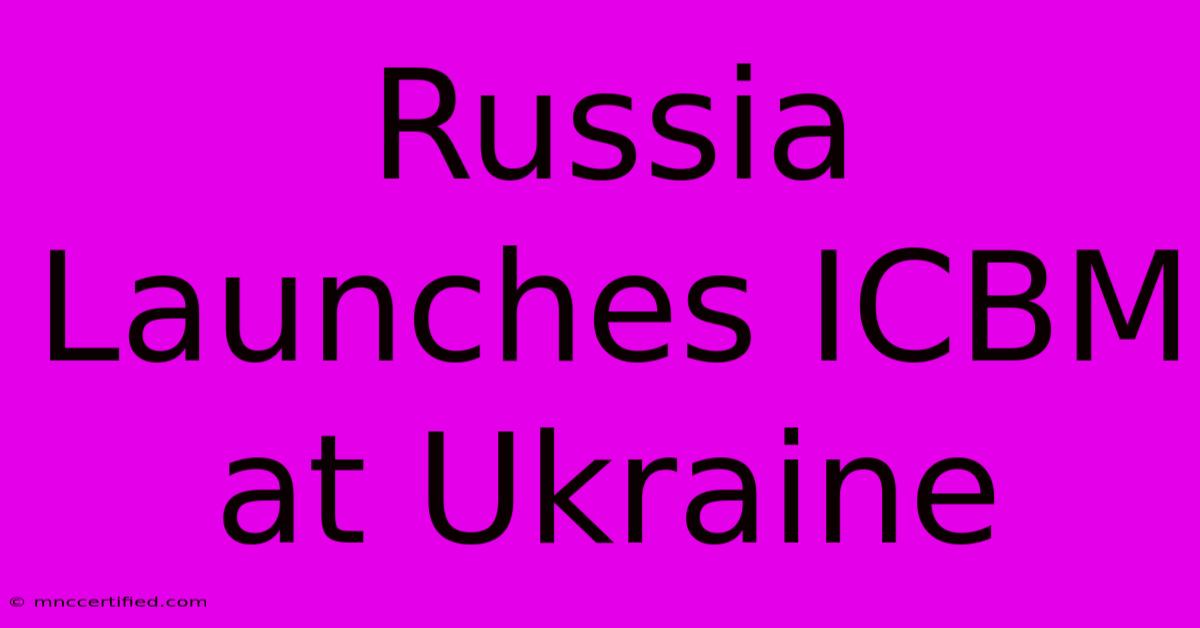Russia Launches ICBM At Ukraine

Table of Contents
Russia Launches ICBM at Ukraine: A Deep Dive into the Unfolding Crisis
The claim that Russia launched an Intercontinental Ballistic Missile (ICBM) at Ukraine is extremely serious and requires careful analysis. While there have been reports circulating online and in some less reputable news outlets, there is currently no credible evidence from verified sources to substantiate this claim. It's crucial to rely on information from trustworthy, established news organizations and official government statements before accepting such a dramatic assertion. The consequences of such an event would be catastrophic, making the need for verifiable information paramount.
This article will explore the potential implications of such a scenario, discuss the current geopolitical climate, and highlight the importance of responsible reporting in times of crisis.
Understanding the Gravity of an ICBM Launch
An ICBM launch targeting Ukraine would represent an unprecedented escalation of the ongoing conflict. ICBMs are designed for long-range nuclear strikes, capable of delivering devastating payloads across vast distances. The use of such a weapon would have global ramifications, potentially triggering a wider conflict and violating numerous international treaties and norms.
The potential consequences include:
- Massive civilian casualties: An ICBM strike would cause widespread destruction and an unimaginable loss of human life.
- Environmental catastrophe: The blast and subsequent fallout would have long-term environmental consequences.
- Global instability: Such an act would trigger a severe crisis in international relations and likely lead to retaliatory actions.
- Nuclear proliferation: The event could potentially embolden other nations to develop and use their own nuclear arsenals.
Analyzing the Current Information Landscape
The absence of confirmation from major international news agencies, governments, or independent verification sources should raise serious doubts about the veracity of claims regarding an ICBM strike. The spread of misinformation and disinformation is a significant challenge during times of conflict. It is imperative to:
- Verify sources: Always cross-reference information from multiple trusted sources before accepting any claims as fact.
- Be wary of social media: Social media platforms can be breeding grounds for misinformation. Exercise caution and critical thinking when encountering such information.
- Consult official statements: Refer to official statements from governments and international organizations for accurate information.
The Geopolitical Context
The ongoing conflict in Ukraine is a complex and volatile situation. Understanding the geopolitical context is vital to interpreting the information surrounding the alleged ICBM launch. Factors to consider include:
- NATO involvement: The role of NATO and its member states in the conflict significantly influences the dynamics of the situation.
- International sanctions: The impact of international sanctions on Russia and its response should be considered.
- Potential for escalation: The conflict’s potential for further escalation is a significant concern.
The Importance of Responsible Reporting
In the face of potentially devastating news, responsible reporting is crucial. Media outlets have a responsibility to:
- Verify information rigorously: Before publishing any information, particularly about highly sensitive events like an ICBM launch, verification should be a top priority.
- Avoid sensationalism: Responsible reporting avoids unnecessary exaggeration or sensationalism.
- Correct errors promptly: If mistakes are made, corrections should be issued promptly and transparently.
Conclusion:
While unsubstantiated claims about Russia launching an ICBM at Ukraine are circulating, there is currently no credible evidence to support this assertion. It’s crucial to rely on verified information from reputable sources. The potential consequences of such an event are catastrophic, making responsible reporting and careful analysis of information vital. The current geopolitical climate demands a cautious and fact-based approach to assessing information related to this conflict. The situation remains highly dynamic, and continuous monitoring of official sources is essential.

Thank you for visiting our website wich cover about Russia Launches ICBM At Ukraine. We hope the information provided has been useful to you. Feel free to contact us if you have any questions or need further assistance. See you next time and dont miss to bookmark.
Featured Posts
-
Westbrooks Lame Call Nba Fans React
Nov 21, 2024
-
Coachella 2025 Lineup Officially Announced
Nov 21, 2024
-
John Prescott Dies Aged 86
Nov 21, 2024
-
Home Insurance Total Loss Payout
Nov 21, 2024
-
State Farm Insurance In The News
Nov 21, 2024